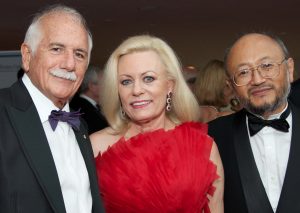It’s difficult to remember what the Kansas City skyline looked like 20 years ago, before the Kauffman Center for the Performing Arts began to take shape at 16th and Broadway. Today anyone who drives through our city must remember one thing: This internationally acclaimed, 316,000-square-feet structure stands as a testament not just to the importance of arts in American lives but also to the power of women to get things done.
In particular, to the fortitude and persistence of Julia Irene Dennie-Kauffman, who brought all of her life-lessons to bear in a process that took 20 years of her life to bring about.

The Kauffman Center for the Performing Arts opened in September 2011 to great fanfare including receptions, concerts, a ball, fireworks, and an open house in which the whole community was invited to tour the facility.
Nevertheless the Center, which opened in 2011, is just the most visible part of the activities of the Muriel McBrien Kauffman Family Foundation, which each year gives grants to countless nonprofit organizations large and small: and not just in Kansas City, but also in New York and Toronto. Locally any time you attend a performance of music, dance, or theater, you are almost certain to find this Foundation listed among the major donors in your playbill.
Julia is recognized worldwide as a major North American arts philanthropist, but she prefers to give credit to others: beginning with her mother, Muriel McBrien Kauffman, who moved here from Toronto when she married Ewing Marion Kauffman, the legendary founder of Marion Laboratories, and brought a young daughter in tow. “I follow my mother’s mission, which was to give to hundreds of things, even down to $1,000, across a four-county area,” Julia said recently. “Because all of it helps to feed the arts and helps to feed the Center.”
These grants have become a sort of badge of honor for local organizations. “And it’s with the little groups that it can make the largest impact,” Julia said, adding that notable funding also goes to bringing some 50,000 students into the Kauffman Center each year. “My mother was adamant, and so am I, about getting children to come and hear music.”

Architect Moshe Safdie, Julia Irene Dennie-Kauffman, and Yasuhisa Toyota celebrated a successful opening of a decades-long project.
It was Muriel Kauffman who brought the first female sales reps to Marion Labs; Muriel who was co-owner of the Kansas City Royals; and Muriel who reportedly became the first woman to step onto the floor of the New York Stock Exchange.
And later it was Muriel, the philanthropist, who set Ken Dworak to work finding a venue for a performing arts center. “Everyone keeps saying Muriel Kauffman ‘dreamt’, ” Julia said. “My mother never dreamt in her life: She did things.”
Julia also gives a great deal of credit and honor to Ewing Marion Kauffman, who helped form her into the business-savvy donor that she is today. “He was one of the smartest men I ever met,” she said. “He was brilliant and fair … and he taught me about business. … He would pick out my courses in college: I took speed reading, I took business law. He was constantly teaching, and so I was constantly learning.”
Ewing was actually Julia’s second dad, and she also gives credit to her birth father, Lorne Dennie, for nudging her toward quality education. He also encouraged Julia’s musical ambitions. “He’s the one who insisted on my piano studies,” Julia said of Lorne, who died when she was 14, “and he’s the one who sent me to private school.” She pleaded with him not to send her to Branksome Hall, a prestigious Toronto all-girls school. But behold, its rigors paid off.

The vision of Julia and her mother, Muriel, to invite thousands of children each year to the Kauffman Center is seen realized here at a Kansas City Symphony Young People’s Concert. / Photo by Eric Williams
“He said to me: One day, young lady, you’ll thank me. And he was right: I’ve met Branksome Hall girls all over the world who are highly successful.” In tribute to the important role that Lorne played in her early life, Julia recently added his last name to her now-hyphenated surname.
Julia continued to foster the love of music she learned as a girl, earning a degree in piano at the University of Toronto. And that love, which she credits partly to Canada’s rich cultural life, has remained a driving force behind her belief in the importance of music in our lives.
It has also shaped every decision in the planning and construction of the Kauffman Center. “Because the arts can really help educate you,” she said. “It’s not just entertainment: When you are reading music, for example, it’s like working a crossword puzzle. It develops your brain.”
Staying “on mission” is critical for Julia, too, which is why the foundation named for Muriel Kauffman recently added a word to its name, becoming the Muriel McBrien Kauffman Family Foundation. “I’ve watched what happens to other foundations with family names that have been taken away from the family … or that have not included the family, and then changed their mission statements.”

Helping to break ground on the Kauffman Center in October 2006 were, from left: Terry Dunn, Tom McDonnell, Don Hall, Sr., Ken Dworak, Center Director Jane Chu, Lieutenant Governor Peter Kinder, Julia Irene Dennie-Kauffman, architect Moshe Safdie, facilities designer Richard Pilbrow, acoustician Yasuhisa Toyota, Mayor Kay Barnes, Jan Kreamer, Shirley Helzberg, Barnett Helzberg, and Lou Smith.
To make sure things stay on the rails, Julia has made certain that the foundation’s leadership includes her three daughters (Julia Irene Power Weld, Lauren Muriel-Marion LaPointe, and Alexandra Ewing Moore) and her granddaughter, Brittany Muriel-Marion LaPointe.
“I want it to stay on mission … and I want to keep it moving for Kansas City, for the arts, and for the Performing Arts Center.”
Looking to the future, there is still work to be done throughout the city, “including with some of the long-term projects,” she added. “The area at 18th and Vine is one I do not want to see fail. It’s really thriving, and I’d like to see it keep going forward.”
Cover photo of the Kauffman Center at dusk by Tim Hursley.
—By Paul Horsley